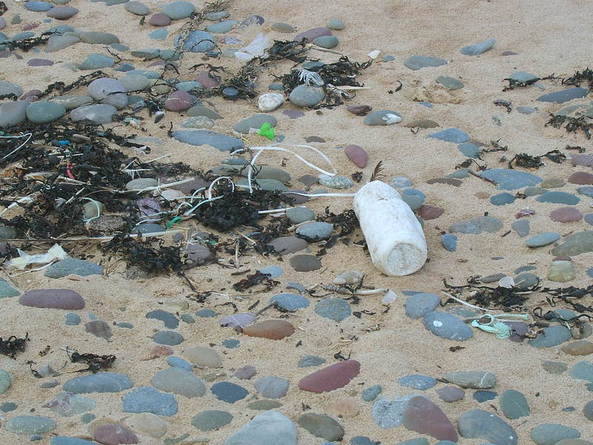|
There's a saying, "what goes around, comes around" and you could apply that to rubbish.
The problem is that when we let a balloon go, or chuck a plastic bag away, there's no telling where the wind will take it. Bags are just taken with the wind, out of rubbish bins, land fill, rubbish trucks, and there's no way of knowing where it will come to land.

The Marine Conservation Society has the results of its 2016 Great British Beach Clean which took place in September. Nearly 6,000 volunteers cleaned 364 beaches around the UK. The litter they found was recorded. 268,384 pieces of rubbish were collected.
We're doing better with plastic bag use
The good news is that this is slightly lower than the previous year. And the number of plastic bags almost HALVED in a year - probably, the MCS thinks, due to the plastic bag charge which was introduced, where shoppers taking a plastic bag are charged 5p. This shows that legislation CAN make a difference.
In China similarly, a limit on ultra-thin plastic bags significantly reduced bag-related polution. According to Chinese government estimates, 40 BILLION bags were not used.
Many countries have also introduced bag limits in recent years. And why wouldn't they? Countries who really care about the health and wellbeing of ALL their citizens, people and animals, will take steps like this.
Plastic bags can take 100 years plus to decompose. They gradually break down into small pieces over periods over time. Eventually. And they soak up toxins. Fish, turtles and whales think they are food They eat them and these toxins enter the food chain. The Ocean Conservancy recently said that platic bags are the second most deadly threat to sea surtles, birds and marine mammals.
The United Nations Environment Programme estimates that the world's plastic rubbish and refuge kills about 1 million sea birds a year.
Getting rid of thin plastic bags will be easier than removing debris. It will be cheaper, and save local and national governments and taxpayers everywhere paying for rubbish pick-ups.
One dead whale was discovered to have "enough plastic bags and fishing nets in its stomacy to fill an excavator bucket".
It's time to move to ban plastic bags full stop.
Another thing we need to change
And there's another thing. Balloon rubbish is on the way up. Please don't let go of balloons. I often pick up balloons on walks with my dog - I spot them across a field and go to investigate. I take them home and bin them. But I still can't be sure of where they end up.
The Marine Conservation Society found that balloon rubbish was up about 50% on our beaches. Widllife think they are something to eat and they can get strangled by the string we use to hold on to balloons. Balloons can block digestive systems, so animals starve.
If people can change their behaviour for the better and reduce their use of plastic bags, we can do the same for balloons. The MCS's aim is to stop all intentional balloon and lantern releases around the UK and to get balloons and lanterns classed as litter and they have a Don't Let Go campaign. Meantime, you can help put pressure on your council by encouraging them and nudging them to ban the intentional release of balloons and sky lanterns on their land. And you can use alternative ideas to balloons.
Click here to find out more about the Don't Let Go campaign.
|
